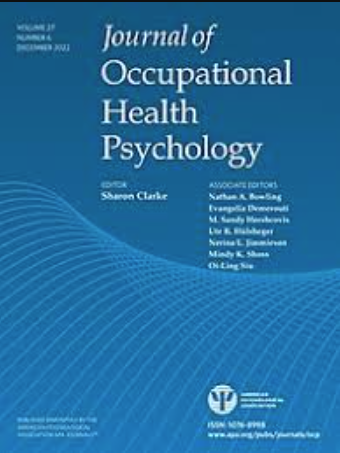Adding fuel to the fire: The exacerbating effects of calling intensity on the relationship between emotionally disturbing work and employee health.
IF 3.9
1区 心理学
Q1 PSYCHOLOGY, APPLIED
引用次数: 4
Abstract
The burgeoning occupational callings literature has shown that feeling called to a job is associated with an array of positive job-, career-, and health-related outcomes. However, recent studies have begun to indicate that there may also be a "negative side" of callings. The present study builds on this emerging perspective to examine whether feeling called to a job makes helping professionals more vulnerable to the negative effects of acute stressors. Specifically, we integrated identity, cognitive rumination, and psychological detachment theories to explain how feeling called to one's job (i.e., the strength of one's calling intensity) might bolster the negative, indirect relationship between emotionally disturbing work and strain (i.e., mental exhaustion, sleep quality, and alcohol consumption) through negative work rumination. Results from a 10-week diary study with a national U.S. sample of 211 paramedics revealed that on weeks that paramedics experienced more emotionally disturbing work, they engaged in greater levels of negative work rumination, which in turn was associated with greater mental exhaustion and worse sleep quality, but not greater alcohol consumption. In addition, calling intensity moderated the indirect effect of emotionally disturbing work on both mental exhaustion and sleep quality, such that these indirect effects were stronger among those with higher (vs. lower) levels of calling intensity. These results provide evidence that employees who feel most called to their jobs may be particularly vulnerable to short-term negative outcomes associated with emotionally disturbing work. (PsycInfo Database Record (c) 2022 APA, all rights reserved).火上浇油:打电话的强度加剧了令人情绪不安的工作与员工健康之间的关系。
新兴的职业召唤文献表明,对工作的召唤感与一系列积极的工作、职业和健康相关的结果有关。然而,最近的研究已经开始表明,呼唤也可能有“负面的一面”。本研究建立在这一新兴观点的基础上,以检验工作的召唤感是否会使帮助专业人员更容易受到急性压力源的负面影响。具体而言,我们整合了身份、认知沉思和心理超脱理论,以解释对工作的召唤感(即召唤强度的强度)如何通过消极的工作沉思来增强情绪困扰的工作与压力(即精神疲惫、睡眠质量和饮酒)之间的消极间接关系。对211名美国全国医护人员进行的为期10周的日记研究结果显示,在医护人员经历更令人情绪不安的工作的几周里,他们会进行更高程度的负面工作沉思,这反过来会导致更大的精神疲惫和更差的睡眠质量,但不会导致更多的饮酒。此外,呼叫强度调节了情绪干扰工作对精神疲惫和睡眠质量的间接影响,因此这些间接影响在呼叫强度较高(与较低)的人中更强。这些结果提供了证据,证明那些对工作最感兴趣的员工可能特别容易受到与情绪困扰的工作相关的短期负面结果的影响。(PsycInfo数据库记录(c)2022 APA,保留所有权利)。
本文章由计算机程序翻译,如有差异,请以英文原文为准。
求助全文
约1分钟内获得全文
求助全文
来源期刊
CiteScore
8.20
自引率
5.90%
发文量
46
期刊介绍:
Journal of Occupational Health Psychology offers research, theory, and public policy articles in occupational health psychology, an interdisciplinary field representing a broad range of backgrounds, interests, and specializations. Occupational health psychology concerns the application of psychology to improving the quality of work life and to protecting and promoting the safety, health, and well-being of workers. This journal focuses on the work environment, the individual, and the work-family interface.

 求助内容:
求助内容: 应助结果提醒方式:
应助结果提醒方式:


